Inter-cultural Management
VerifiedAdded on 2023/04/20
|13
|3054
|119
AI Summary
This report evaluates the role of culture in international business and highlights the Hofstede cultural dimensional model. It discusses the different aspects of culture such as power distance, uncertainty avoidance, individualism vs. collectivism, masculinity vs. femininity, and long term vs. short term orientation. The report emphasizes the importance of understanding culture for successful global operations.
Contribute Materials
Your contribution can guide someone’s learning journey. Share your
documents today.
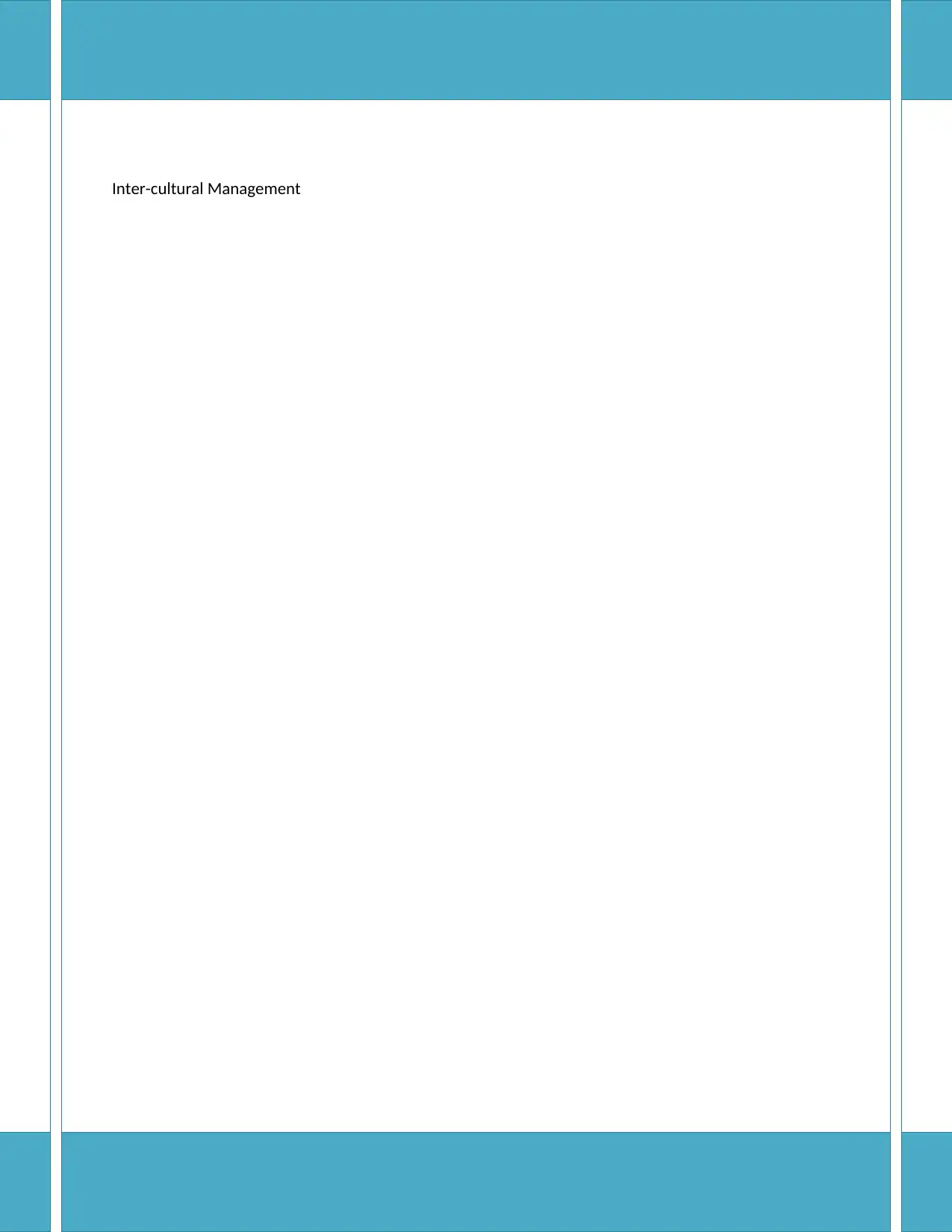
Inter-cultural Management
Secure Best Marks with AI Grader
Need help grading? Try our AI Grader for instant feedback on your assignments.
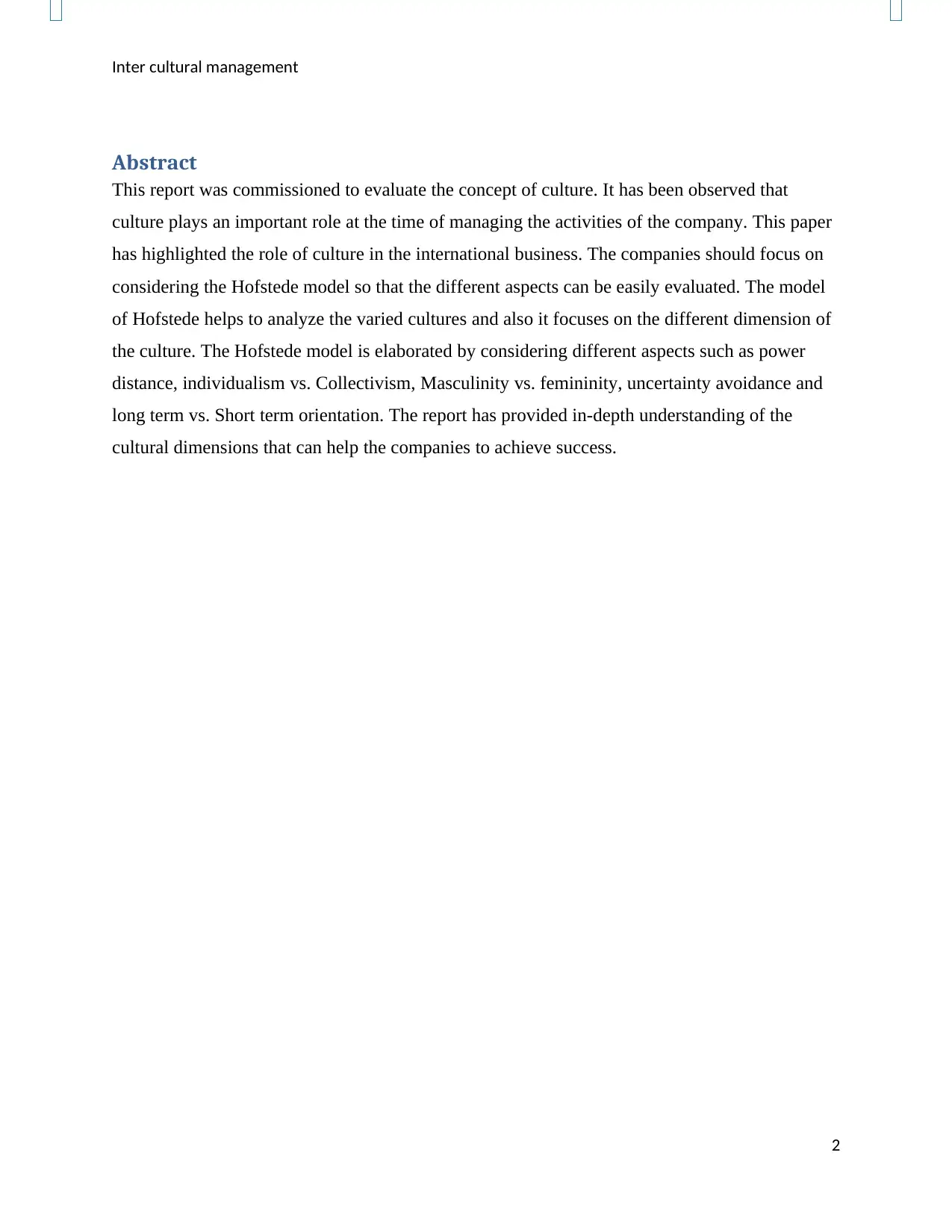
Inter cultural management
Abstract
This report was commissioned to evaluate the concept of culture. It has been observed that
culture plays an important role at the time of managing the activities of the company. This paper
has highlighted the role of culture in the international business. The companies should focus on
considering the Hofstede model so that the different aspects can be easily evaluated. The model
of Hofstede helps to analyze the varied cultures and also it focuses on the different dimension of
the culture. The Hofstede model is elaborated by considering different aspects such as power
distance, individualism vs. Collectivism, Masculinity vs. femininity, uncertainty avoidance and
long term vs. Short term orientation. The report has provided in-depth understanding of the
cultural dimensions that can help the companies to achieve success.
2
Abstract
This report was commissioned to evaluate the concept of culture. It has been observed that
culture plays an important role at the time of managing the activities of the company. This paper
has highlighted the role of culture in the international business. The companies should focus on
considering the Hofstede model so that the different aspects can be easily evaluated. The model
of Hofstede helps to analyze the varied cultures and also it focuses on the different dimension of
the culture. The Hofstede model is elaborated by considering different aspects such as power
distance, individualism vs. Collectivism, Masculinity vs. femininity, uncertainty avoidance and
long term vs. Short term orientation. The report has provided in-depth understanding of the
cultural dimensions that can help the companies to achieve success.
2
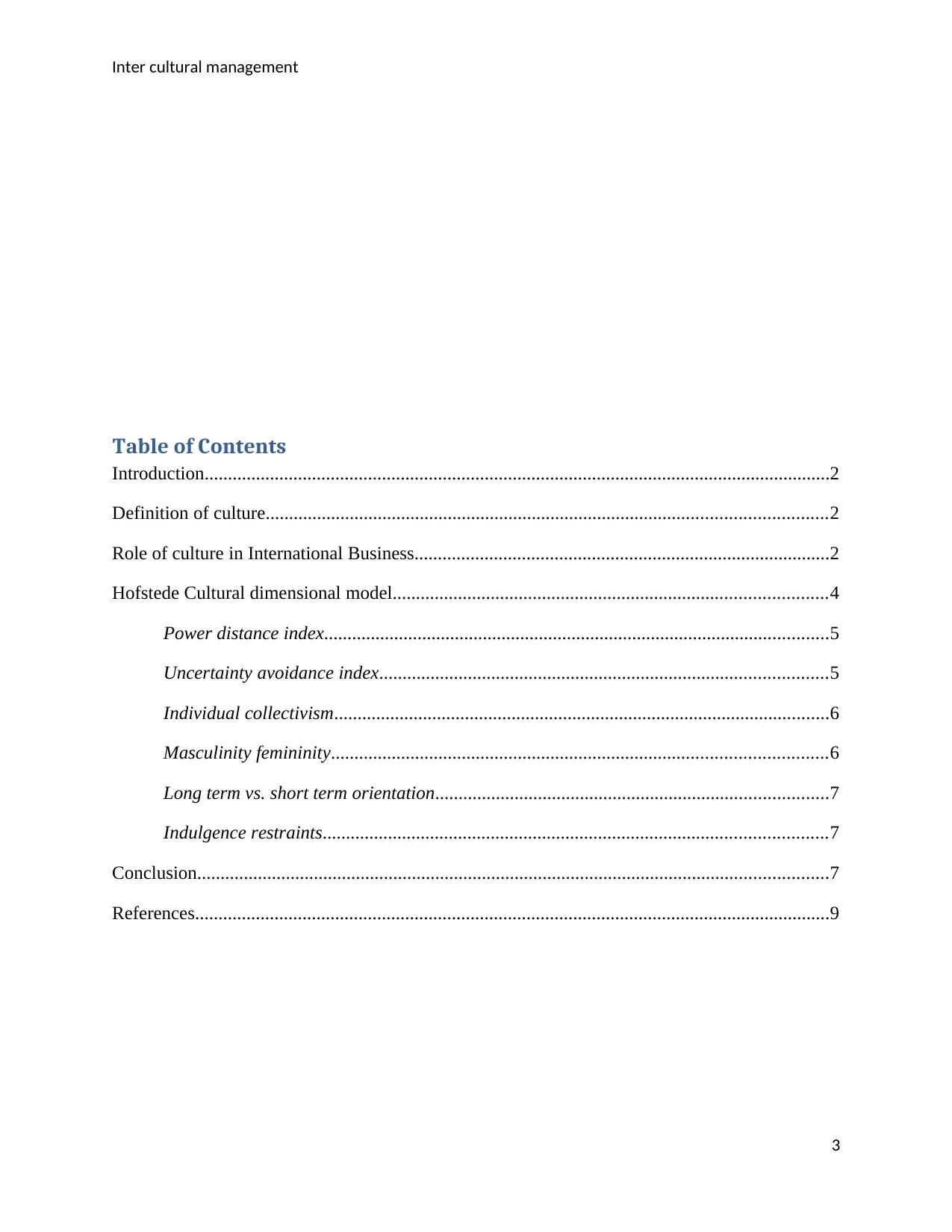
Inter cultural management
Table of Contents
Introduction......................................................................................................................................2
Definition of culture........................................................................................................................2
Role of culture in International Business.........................................................................................2
Hofstede Cultural dimensional model.............................................................................................4
Power distance index............................................................................................................5
Uncertainty avoidance index................................................................................................5
Individual collectivism..........................................................................................................6
Masculinity femininity..........................................................................................................6
Long term vs. short term orientation....................................................................................7
Indulgence restraints............................................................................................................7
Conclusion.......................................................................................................................................7
References........................................................................................................................................9
3
Table of Contents
Introduction......................................................................................................................................2
Definition of culture........................................................................................................................2
Role of culture in International Business.........................................................................................2
Hofstede Cultural dimensional model.............................................................................................4
Power distance index............................................................................................................5
Uncertainty avoidance index................................................................................................5
Individual collectivism..........................................................................................................6
Masculinity femininity..........................................................................................................6
Long term vs. short term orientation....................................................................................7
Indulgence restraints............................................................................................................7
Conclusion.......................................................................................................................................7
References........................................................................................................................................9
3
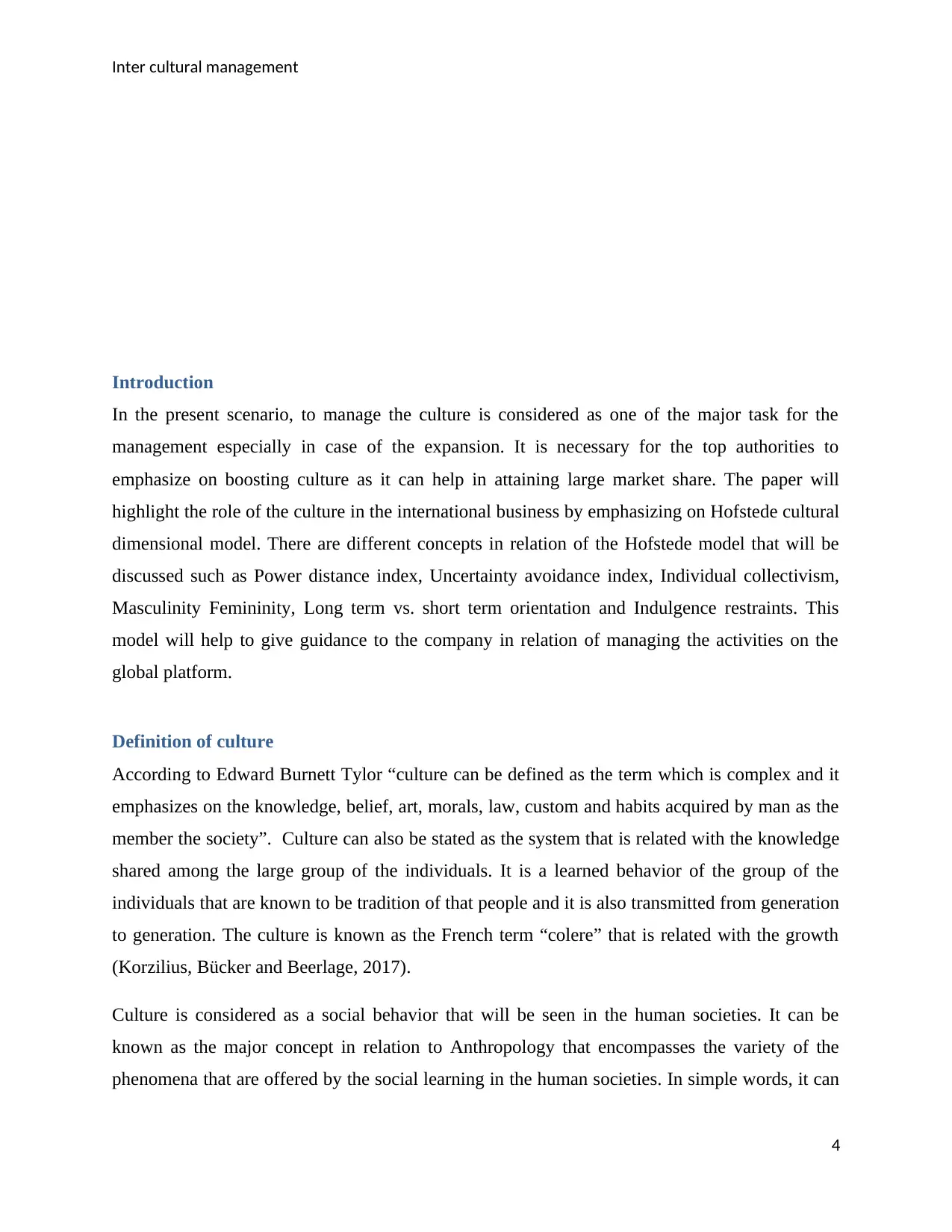
Inter cultural management
Introduction
In the present scenario, to manage the culture is considered as one of the major task for the
management especially in case of the expansion. It is necessary for the top authorities to
emphasize on boosting culture as it can help in attaining large market share. The paper will
highlight the role of the culture in the international business by emphasizing on Hofstede cultural
dimensional model. There are different concepts in relation of the Hofstede model that will be
discussed such as Power distance index, Uncertainty avoidance index, Individual collectivism,
Masculinity Femininity, Long term vs. short term orientation and Indulgence restraints. This
model will help to give guidance to the company in relation of managing the activities on the
global platform.
Definition of culture
According to Edward Burnett Tylor “culture can be defined as the term which is complex and it
emphasizes on the knowledge, belief, art, morals, law, custom and habits acquired by man as the
member the society”. Culture can also be stated as the system that is related with the knowledge
shared among the large group of the individuals. It is a learned behavior of the group of the
individuals that are known to be tradition of that people and it is also transmitted from generation
to generation. The culture is known as the French term “colere” that is related with the growth
(Korzilius, Bücker and Beerlage, 2017).
Culture is considered as a social behavior that will be seen in the human societies. It can be
known as the major concept in relation to Anthropology that encompasses the variety of the
phenomena that are offered by the social learning in the human societies. In simple words, it can
4
Introduction
In the present scenario, to manage the culture is considered as one of the major task for the
management especially in case of the expansion. It is necessary for the top authorities to
emphasize on boosting culture as it can help in attaining large market share. The paper will
highlight the role of the culture in the international business by emphasizing on Hofstede cultural
dimensional model. There are different concepts in relation of the Hofstede model that will be
discussed such as Power distance index, Uncertainty avoidance index, Individual collectivism,
Masculinity Femininity, Long term vs. short term orientation and Indulgence restraints. This
model will help to give guidance to the company in relation of managing the activities on the
global platform.
Definition of culture
According to Edward Burnett Tylor “culture can be defined as the term which is complex and it
emphasizes on the knowledge, belief, art, morals, law, custom and habits acquired by man as the
member the society”. Culture can also be stated as the system that is related with the knowledge
shared among the large group of the individuals. It is a learned behavior of the group of the
individuals that are known to be tradition of that people and it is also transmitted from generation
to generation. The culture is known as the French term “colere” that is related with the growth
(Korzilius, Bücker and Beerlage, 2017).
Culture is considered as a social behavior that will be seen in the human societies. It can be
known as the major concept in relation to Anthropology that encompasses the variety of the
phenomena that are offered by the social learning in the human societies. In simple words, it can
4
Secure Best Marks with AI Grader
Need help grading? Try our AI Grader for instant feedback on your assignments.
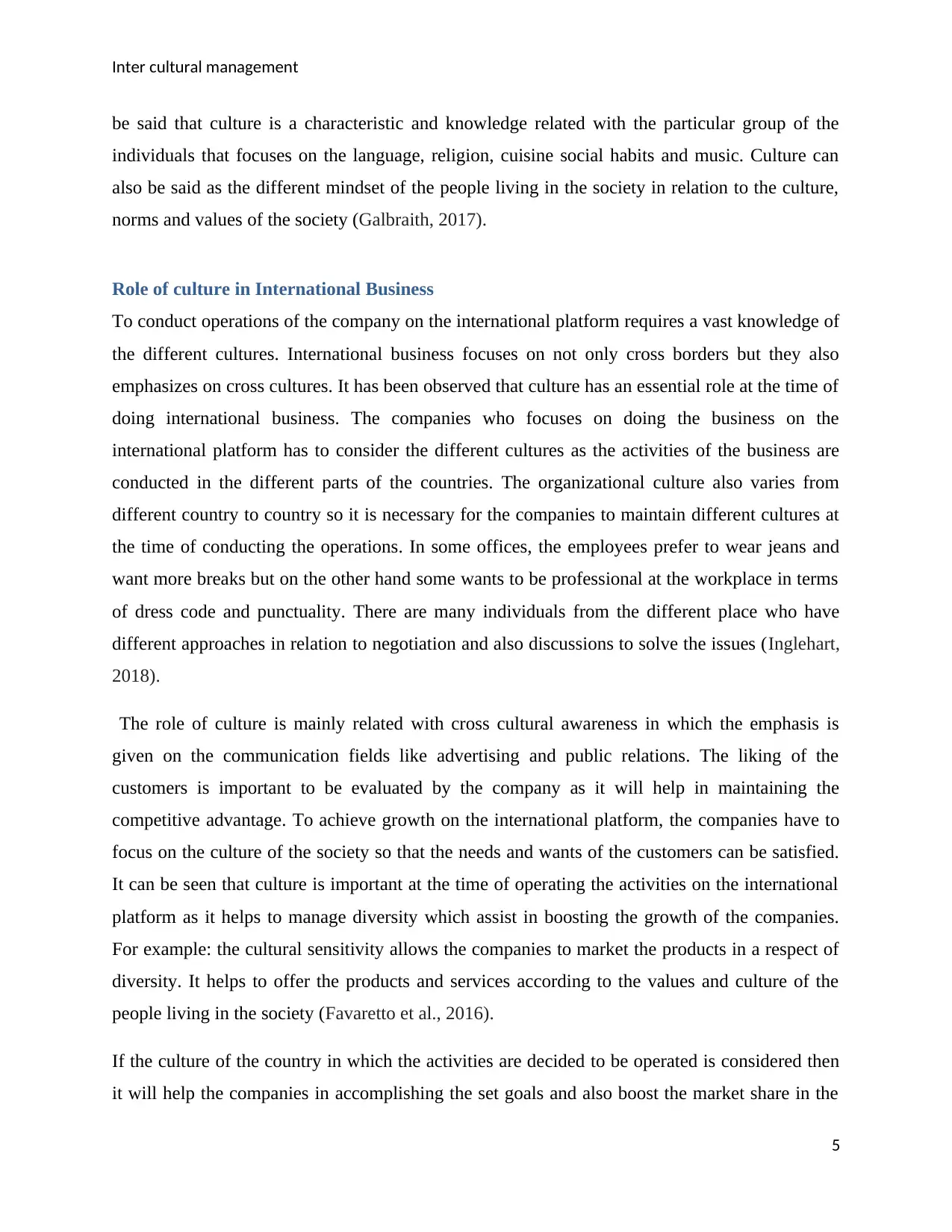
Inter cultural management
be said that culture is a characteristic and knowledge related with the particular group of the
individuals that focuses on the language, religion, cuisine social habits and music. Culture can
also be said as the different mindset of the people living in the society in relation to the culture,
norms and values of the society (Galbraith, 2017).
Role of culture in International Business
To conduct operations of the company on the international platform requires a vast knowledge of
the different cultures. International business focuses on not only cross borders but they also
emphasizes on cross cultures. It has been observed that culture has an essential role at the time of
doing international business. The companies who focuses on doing the business on the
international platform has to consider the different cultures as the activities of the business are
conducted in the different parts of the countries. The organizational culture also varies from
different country to country so it is necessary for the companies to maintain different cultures at
the time of conducting the operations. In some offices, the employees prefer to wear jeans and
want more breaks but on the other hand some wants to be professional at the workplace in terms
of dress code and punctuality. There are many individuals from the different place who have
different approaches in relation to negotiation and also discussions to solve the issues (Inglehart,
2018).
The role of culture is mainly related with cross cultural awareness in which the emphasis is
given on the communication fields like advertising and public relations. The liking of the
customers is important to be evaluated by the company as it will help in maintaining the
competitive advantage. To achieve growth on the international platform, the companies have to
focus on the culture of the society so that the needs and wants of the customers can be satisfied.
It can be seen that culture is important at the time of operating the activities on the international
platform as it helps to manage diversity which assist in boosting the growth of the companies.
For example: the cultural sensitivity allows the companies to market the products in a respect of
diversity. It helps to offer the products and services according to the values and culture of the
people living in the society (Favaretto et al., 2016).
If the culture of the country in which the activities are decided to be operated is considered then
it will help the companies in accomplishing the set goals and also boost the market share in the
5
be said that culture is a characteristic and knowledge related with the particular group of the
individuals that focuses on the language, religion, cuisine social habits and music. Culture can
also be said as the different mindset of the people living in the society in relation to the culture,
norms and values of the society (Galbraith, 2017).
Role of culture in International Business
To conduct operations of the company on the international platform requires a vast knowledge of
the different cultures. International business focuses on not only cross borders but they also
emphasizes on cross cultures. It has been observed that culture has an essential role at the time of
doing international business. The companies who focuses on doing the business on the
international platform has to consider the different cultures as the activities of the business are
conducted in the different parts of the countries. The organizational culture also varies from
different country to country so it is necessary for the companies to maintain different cultures at
the time of conducting the operations. In some offices, the employees prefer to wear jeans and
want more breaks but on the other hand some wants to be professional at the workplace in terms
of dress code and punctuality. There are many individuals from the different place who have
different approaches in relation to negotiation and also discussions to solve the issues (Inglehart,
2018).
The role of culture is mainly related with cross cultural awareness in which the emphasis is
given on the communication fields like advertising and public relations. The liking of the
customers is important to be evaluated by the company as it will help in maintaining the
competitive advantage. To achieve growth on the international platform, the companies have to
focus on the culture of the society so that the needs and wants of the customers can be satisfied.
It can be seen that culture is important at the time of operating the activities on the international
platform as it helps to manage diversity which assist in boosting the growth of the companies.
For example: the cultural sensitivity allows the companies to market the products in a respect of
diversity. It helps to offer the products and services according to the values and culture of the
people living in the society (Favaretto et al., 2016).
If the culture of the country in which the activities are decided to be operated is considered then
it will help the companies in accomplishing the set goals and also boost the market share in the
5
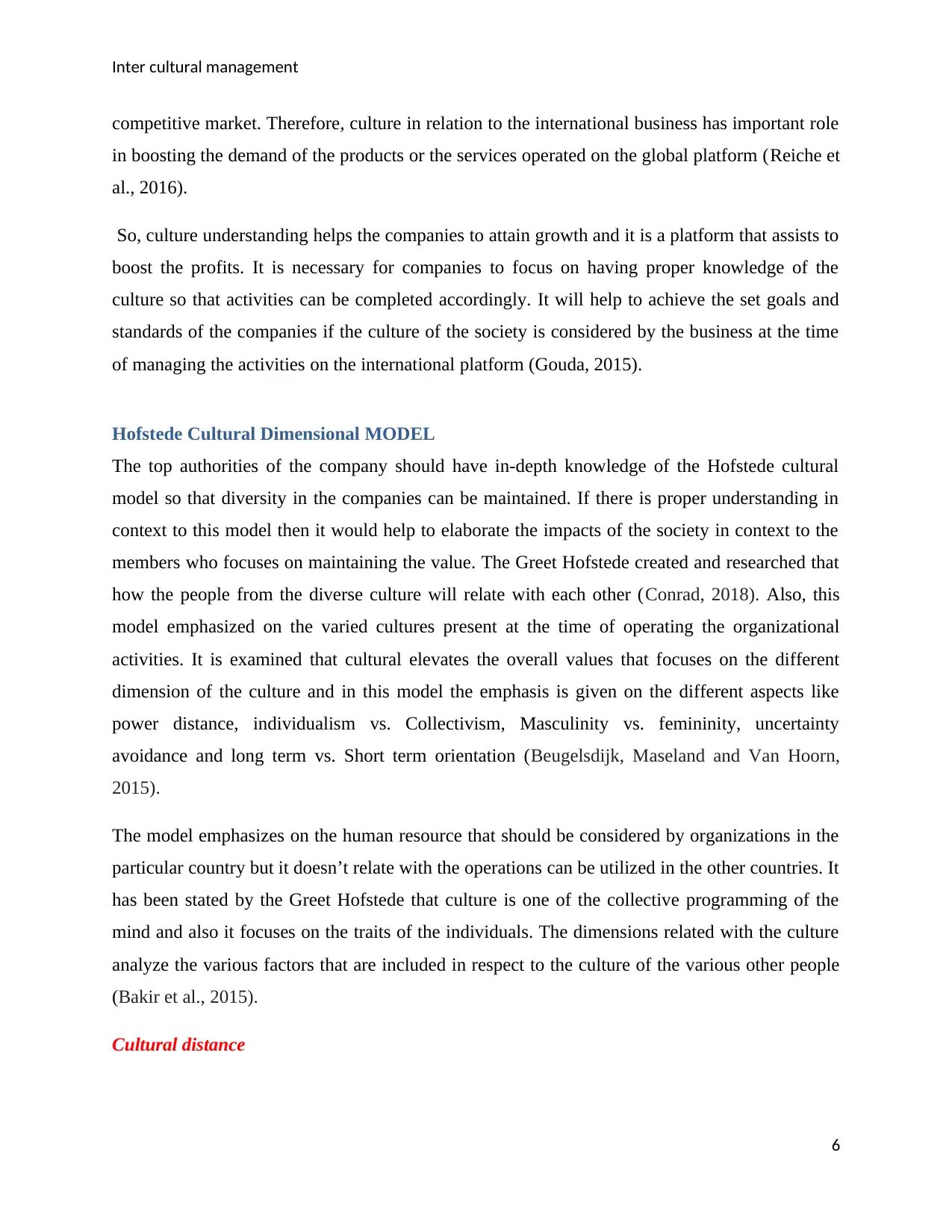
Inter cultural management
competitive market. Therefore, culture in relation to the international business has important role
in boosting the demand of the products or the services operated on the global platform (Reiche et
al., 2016).
So, culture understanding helps the companies to attain growth and it is a platform that assists to
boost the profits. It is necessary for companies to focus on having proper knowledge of the
culture so that activities can be completed accordingly. It will help to achieve the set goals and
standards of the companies if the culture of the society is considered by the business at the time
of managing the activities on the international platform (Gouda, 2015).
Hofstede Cultural Dimensional MODEL
The top authorities of the company should have in-depth knowledge of the Hofstede cultural
model so that diversity in the companies can be maintained. If there is proper understanding in
context to this model then it would help to elaborate the impacts of the society in context to the
members who focuses on maintaining the value. The Greet Hofstede created and researched that
how the people from the diverse culture will relate with each other (Conrad, 2018). Also, this
model emphasized on the varied cultures present at the time of operating the organizational
activities. It is examined that cultural elevates the overall values that focuses on the different
dimension of the culture and in this model the emphasis is given on the different aspects like
power distance, individualism vs. Collectivism, Masculinity vs. femininity, uncertainty
avoidance and long term vs. Short term orientation (Beugelsdijk, Maseland and Van Hoorn,
2015).
The model emphasizes on the human resource that should be considered by organizations in the
particular country but it doesn’t relate with the operations can be utilized in the other countries. It
has been stated by the Greet Hofstede that culture is one of the collective programming of the
mind and also it focuses on the traits of the individuals. The dimensions related with the culture
analyze the various factors that are included in respect to the culture of the various other people
(Bakir et al., 2015).
Cultural distance
6
competitive market. Therefore, culture in relation to the international business has important role
in boosting the demand of the products or the services operated on the global platform (Reiche et
al., 2016).
So, culture understanding helps the companies to attain growth and it is a platform that assists to
boost the profits. It is necessary for companies to focus on having proper knowledge of the
culture so that activities can be completed accordingly. It will help to achieve the set goals and
standards of the companies if the culture of the society is considered by the business at the time
of managing the activities on the international platform (Gouda, 2015).
Hofstede Cultural Dimensional MODEL
The top authorities of the company should have in-depth knowledge of the Hofstede cultural
model so that diversity in the companies can be maintained. If there is proper understanding in
context to this model then it would help to elaborate the impacts of the society in context to the
members who focuses on maintaining the value. The Greet Hofstede created and researched that
how the people from the diverse culture will relate with each other (Conrad, 2018). Also, this
model emphasized on the varied cultures present at the time of operating the organizational
activities. It is examined that cultural elevates the overall values that focuses on the different
dimension of the culture and in this model the emphasis is given on the different aspects like
power distance, individualism vs. Collectivism, Masculinity vs. femininity, uncertainty
avoidance and long term vs. Short term orientation (Beugelsdijk, Maseland and Van Hoorn,
2015).
The model emphasizes on the human resource that should be considered by organizations in the
particular country but it doesn’t relate with the operations can be utilized in the other countries. It
has been stated by the Greet Hofstede that culture is one of the collective programming of the
mind and also it focuses on the traits of the individuals. The dimensions related with the culture
analyze the various factors that are included in respect to the culture of the various other people
(Bakir et al., 2015).
Cultural distance
6
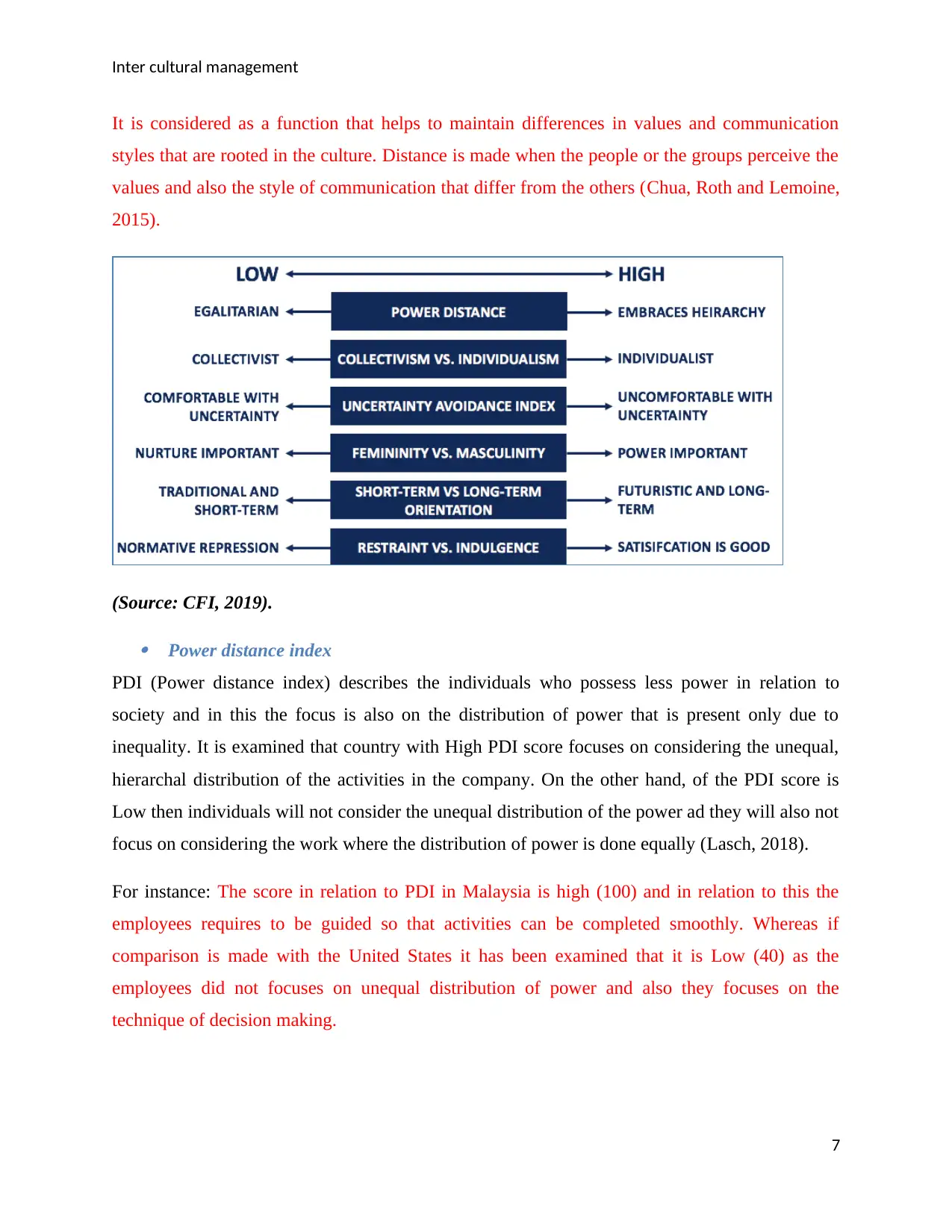
Inter cultural management
It is considered as a function that helps to maintain differences in values and communication
styles that are rooted in the culture. Distance is made when the people or the groups perceive the
values and also the style of communication that differ from the others (Chua, Roth and Lemoine,
2015).
(Source: CFI, 2019).
Power distance index
PDI (Power distance index) describes the individuals who possess less power in relation to
society and in this the focus is also on the distribution of power that is present only due to
inequality. It is examined that country with High PDI score focuses on considering the unequal,
hierarchal distribution of the activities in the company. On the other hand, of the PDI score is
Low then individuals will not consider the unequal distribution of the power ad they will also not
focus on considering the work where the distribution of power is done equally (Lasch, 2018).
For instance: The score in relation to PDI in Malaysia is high (100) and in relation to this the
employees requires to be guided so that activities can be completed smoothly. Whereas if
comparison is made with the United States it has been examined that it is Low (40) as the
employees did not focuses on unequal distribution of power and also they focuses on the
technique of decision making.
7
It is considered as a function that helps to maintain differences in values and communication
styles that are rooted in the culture. Distance is made when the people or the groups perceive the
values and also the style of communication that differ from the others (Chua, Roth and Lemoine,
2015).
(Source: CFI, 2019).
Power distance index
PDI (Power distance index) describes the individuals who possess less power in relation to
society and in this the focus is also on the distribution of power that is present only due to
inequality. It is examined that country with High PDI score focuses on considering the unequal,
hierarchal distribution of the activities in the company. On the other hand, of the PDI score is
Low then individuals will not consider the unequal distribution of the power ad they will also not
focus on considering the work where the distribution of power is done equally (Lasch, 2018).
For instance: The score in relation to PDI in Malaysia is high (100) and in relation to this the
employees requires to be guided so that activities can be completed smoothly. Whereas if
comparison is made with the United States it has been examined that it is Low (40) as the
employees did not focuses on unequal distribution of power and also they focuses on the
technique of decision making.
7
Paraphrase This Document
Need a fresh take? Get an instant paraphrase of this document with our AI Paraphraser
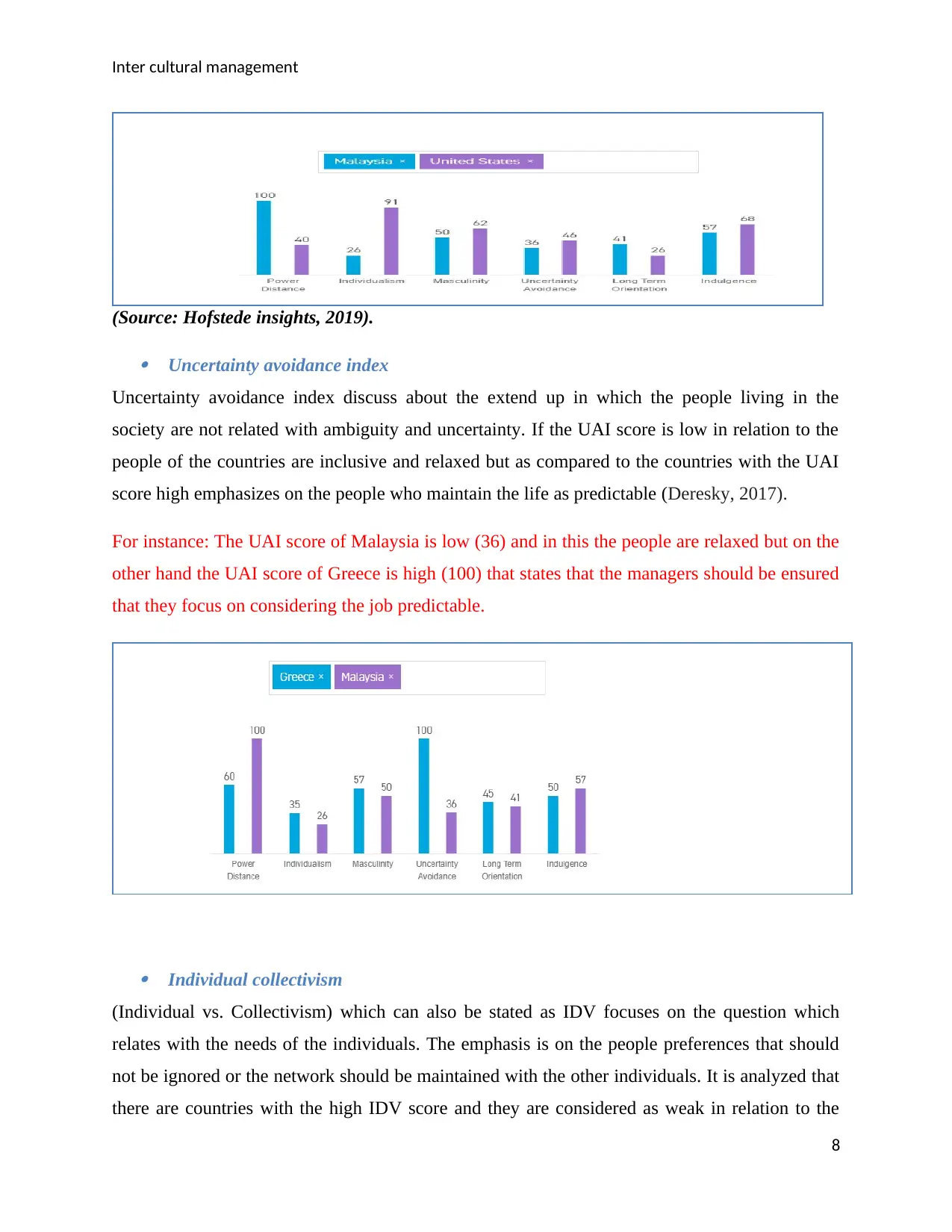
Inter cultural management
(Source: Hofstede insights, 2019).
Uncertainty avoidance index
Uncertainty avoidance index discuss about the extend up in which the people living in the
society are not related with ambiguity and uncertainty. If the UAI score is low in relation to the
people of the countries are inclusive and relaxed but as compared to the countries with the UAI
score high emphasizes on the people who maintain the life as predictable (Deresky, 2017).
For instance: The UAI score of Malaysia is low (36) and in this the people are relaxed but on the
other hand the UAI score of Greece is high (100) that states that the managers should be ensured
that they focus on considering the job predictable.
Individual collectivism
(Individual vs. Collectivism) which can also be stated as IDV focuses on the question which
relates with the needs of the individuals. The emphasis is on the people preferences that should
not be ignored or the network should be maintained with the other individuals. It is analyzed that
there are countries with the high IDV score and they are considered as weak in relation to the
8
(Source: Hofstede insights, 2019).
Uncertainty avoidance index
Uncertainty avoidance index discuss about the extend up in which the people living in the
society are not related with ambiguity and uncertainty. If the UAI score is low in relation to the
people of the countries are inclusive and relaxed but as compared to the countries with the UAI
score high emphasizes on the people who maintain the life as predictable (Deresky, 2017).
For instance: The UAI score of Malaysia is low (36) and in this the people are relaxed but on the
other hand the UAI score of Greece is high (100) that states that the managers should be ensured
that they focus on considering the job predictable.
Individual collectivism
(Individual vs. Collectivism) which can also be stated as IDV focuses on the question which
relates with the needs of the individuals. The emphasis is on the people preferences that should
not be ignored or the network should be maintained with the other individuals. It is analyzed that
there are countries with the high IDV score and they are considered as weak in relation to the
8
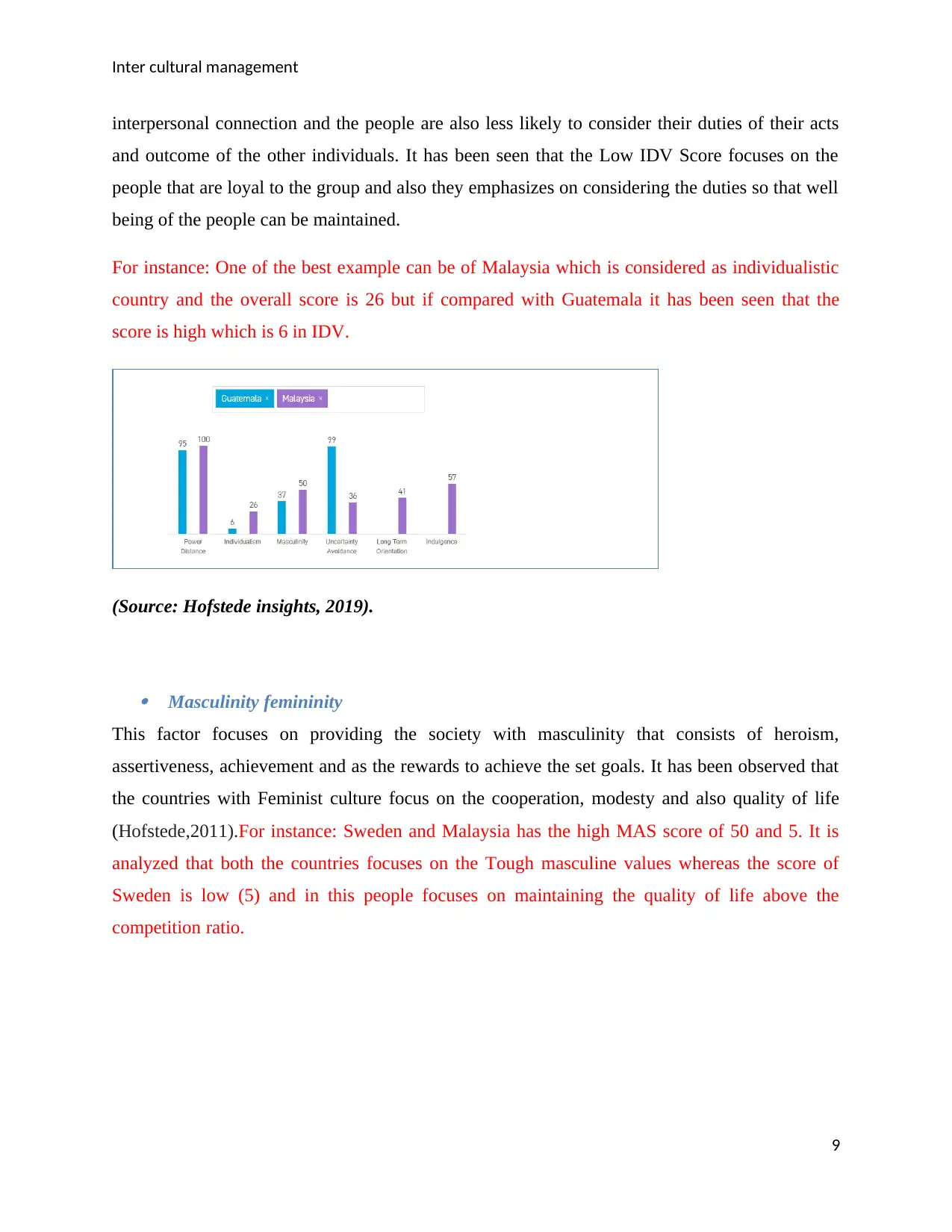
Inter cultural management
interpersonal connection and the people are also less likely to consider their duties of their acts
and outcome of the other individuals. It has been seen that the Low IDV Score focuses on the
people that are loyal to the group and also they emphasizes on considering the duties so that well
being of the people can be maintained.
For instance: One of the best example can be of Malaysia which is considered as individualistic
country and the overall score is 26 but if compared with Guatemala it has been seen that the
score is high which is 6 in IDV.
(Source: Hofstede insights, 2019).
Masculinity femininity
This factor focuses on providing the society with masculinity that consists of heroism,
assertiveness, achievement and as the rewards to achieve the set goals. It has been observed that
the countries with Feminist culture focus on the cooperation, modesty and also quality of life
(Hofstede,2011).For instance: Sweden and Malaysia has the high MAS score of 50 and 5. It is
analyzed that both the countries focuses on the Tough masculine values whereas the score of
Sweden is low (5) and in this people focuses on maintaining the quality of life above the
competition ratio.
9
interpersonal connection and the people are also less likely to consider their duties of their acts
and outcome of the other individuals. It has been seen that the Low IDV Score focuses on the
people that are loyal to the group and also they emphasizes on considering the duties so that well
being of the people can be maintained.
For instance: One of the best example can be of Malaysia which is considered as individualistic
country and the overall score is 26 but if compared with Guatemala it has been seen that the
score is high which is 6 in IDV.
(Source: Hofstede insights, 2019).
Masculinity femininity
This factor focuses on providing the society with masculinity that consists of heroism,
assertiveness, achievement and as the rewards to achieve the set goals. It has been observed that
the countries with Feminist culture focus on the cooperation, modesty and also quality of life
(Hofstede,2011).For instance: Sweden and Malaysia has the high MAS score of 50 and 5. It is
analyzed that both the countries focuses on the Tough masculine values whereas the score of
Sweden is low (5) and in this people focuses on maintaining the quality of life above the
competition ratio.
9
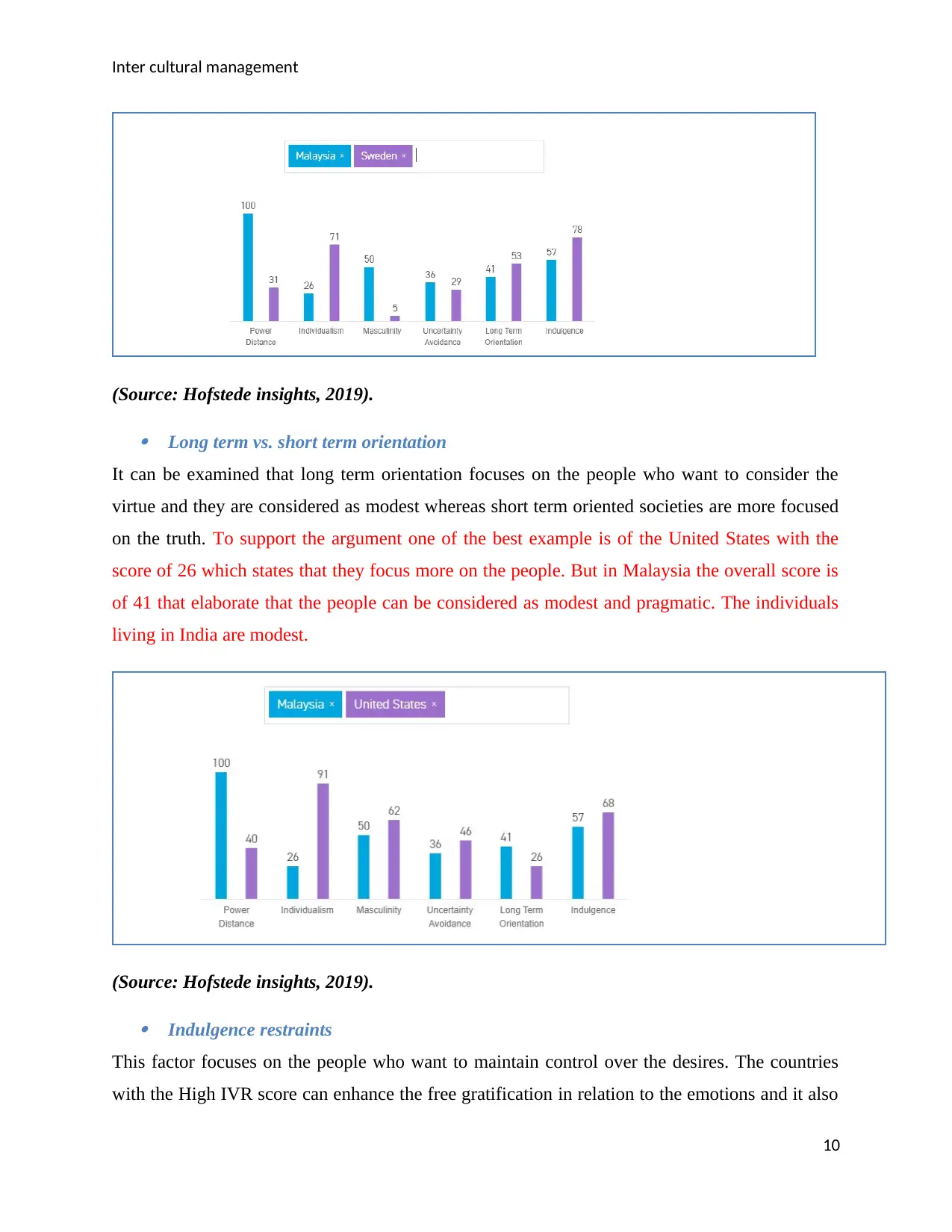
Inter cultural management
(Source: Hofstede insights, 2019).
Long term vs. short term orientation
It can be examined that long term orientation focuses on the people who want to consider the
virtue and they are considered as modest whereas short term oriented societies are more focused
on the truth. To support the argument one of the best example is of the United States with the
score of 26 which states that they focus more on the people. But in Malaysia the overall score is
of 41 that elaborate that the people can be considered as modest and pragmatic. The individuals
living in India are modest.
(Source: Hofstede insights, 2019).
Indulgence restraints
This factor focuses on the people who want to maintain control over the desires. The countries
with the High IVR score can enhance the free gratification in relation to the emotions and it also
10
(Source: Hofstede insights, 2019).
Long term vs. short term orientation
It can be examined that long term orientation focuses on the people who want to consider the
virtue and they are considered as modest whereas short term oriented societies are more focused
on the truth. To support the argument one of the best example is of the United States with the
score of 26 which states that they focus more on the people. But in Malaysia the overall score is
of 41 that elaborate that the people can be considered as modest and pragmatic. The individuals
living in India are modest.
(Source: Hofstede insights, 2019).
Indulgence restraints
This factor focuses on the people who want to maintain control over the desires. The countries
with the High IVR score can enhance the free gratification in relation to the emotions and it also
10
Secure Best Marks with AI Grader
Need help grading? Try our AI Grader for instant feedback on your assignments.
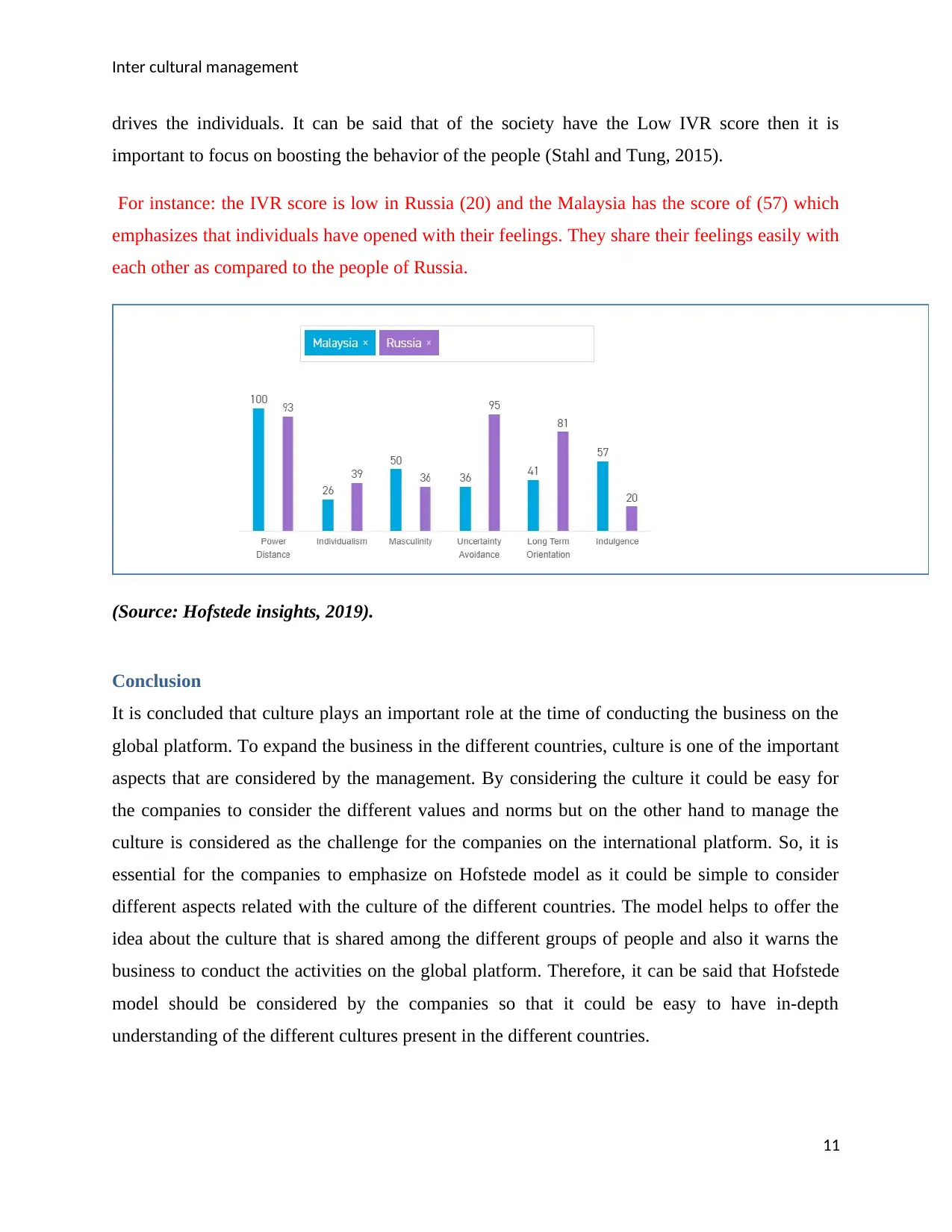
Inter cultural management
drives the individuals. It can be said that of the society have the Low IVR score then it is
important to focus on boosting the behavior of the people (Stahl and Tung, 2015).
For instance: the IVR score is low in Russia (20) and the Malaysia has the score of (57) which
emphasizes that individuals have opened with their feelings. They share their feelings easily with
each other as compared to the people of Russia.
(Source: Hofstede insights, 2019).
Conclusion
It is concluded that culture plays an important role at the time of conducting the business on the
global platform. To expand the business in the different countries, culture is one of the important
aspects that are considered by the management. By considering the culture it could be easy for
the companies to consider the different values and norms but on the other hand to manage the
culture is considered as the challenge for the companies on the international platform. So, it is
essential for the companies to emphasize on Hofstede model as it could be simple to consider
different aspects related with the culture of the different countries. The model helps to offer the
idea about the culture that is shared among the different groups of people and also it warns the
business to conduct the activities on the global platform. Therefore, it can be said that Hofstede
model should be considered by the companies so that it could be easy to have in-depth
understanding of the different cultures present in the different countries.
11
drives the individuals. It can be said that of the society have the Low IVR score then it is
important to focus on boosting the behavior of the people (Stahl and Tung, 2015).
For instance: the IVR score is low in Russia (20) and the Malaysia has the score of (57) which
emphasizes that individuals have opened with their feelings. They share their feelings easily with
each other as compared to the people of Russia.
(Source: Hofstede insights, 2019).
Conclusion
It is concluded that culture plays an important role at the time of conducting the business on the
global platform. To expand the business in the different countries, culture is one of the important
aspects that are considered by the management. By considering the culture it could be easy for
the companies to consider the different values and norms but on the other hand to manage the
culture is considered as the challenge for the companies on the international platform. So, it is
essential for the companies to emphasize on Hofstede model as it could be simple to consider
different aspects related with the culture of the different countries. The model helps to offer the
idea about the culture that is shared among the different groups of people and also it warns the
business to conduct the activities on the global platform. Therefore, it can be said that Hofstede
model should be considered by the companies so that it could be easy to have in-depth
understanding of the different cultures present in the different countries.
11
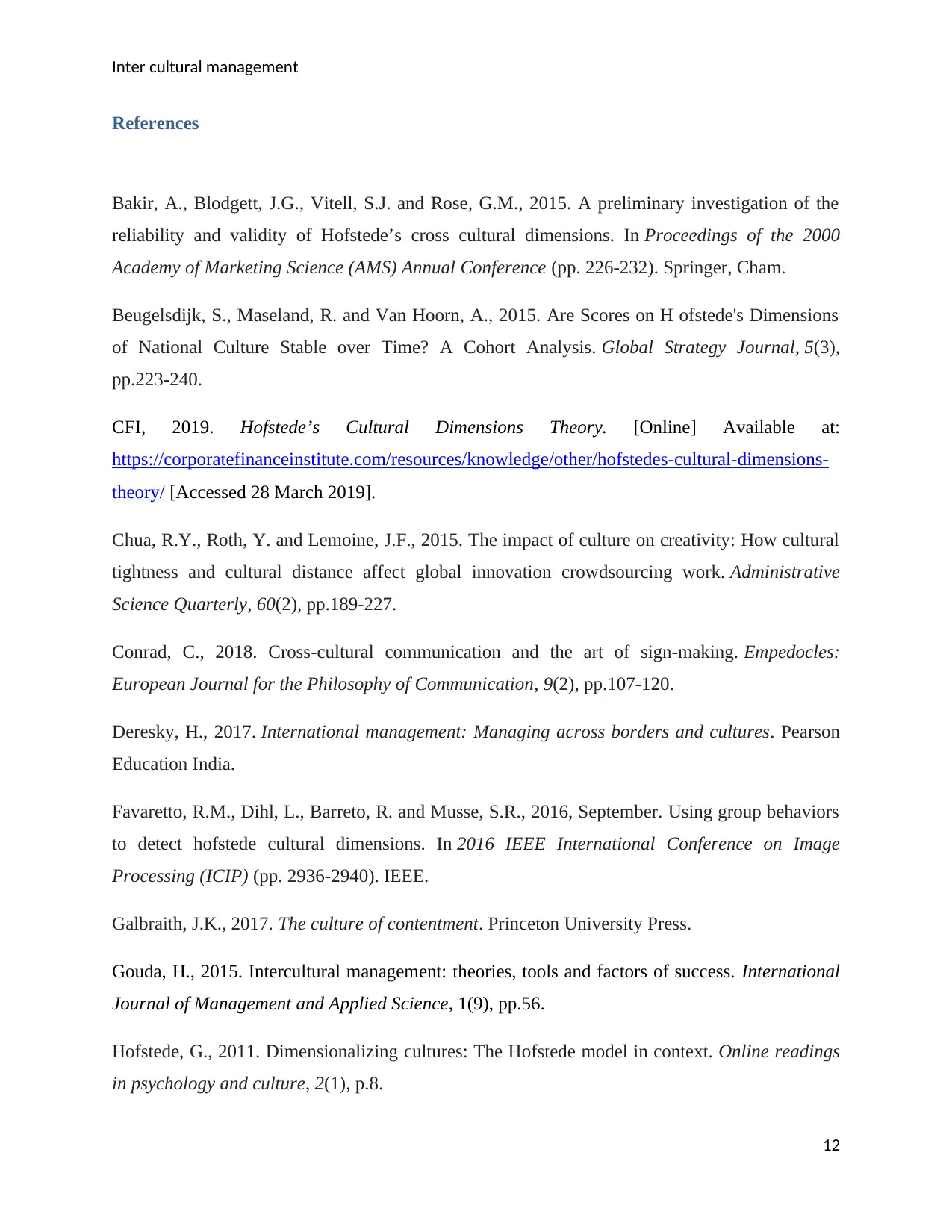
Inter cultural management
References
Bakir, A., Blodgett, J.G., Vitell, S.J. and Rose, G.M., 2015. A preliminary investigation of the
reliability and validity of Hofstede’s cross cultural dimensions. In Proceedings of the 2000
Academy of Marketing Science (AMS) Annual Conference (pp. 226-232). Springer, Cham.
Beugelsdijk, S., Maseland, R. and Van Hoorn, A., 2015. Are Scores on H ofstede's Dimensions
of National Culture Stable over Time? A Cohort Analysis. Global Strategy Journal, 5(3),
pp.223-240.
CFI, 2019. Hofstede’s Cultural Dimensions Theory. [Online] Available at:
https://corporatefinanceinstitute.com/resources/knowledge/other/hofstedes-cultural-dimensions-
theory/ [Accessed 28 March 2019].
Chua, R.Y., Roth, Y. and Lemoine, J.F., 2015. The impact of culture on creativity: How cultural
tightness and cultural distance affect global innovation crowdsourcing work. Administrative
Science Quarterly, 60(2), pp.189-227.
Conrad, C., 2018. Cross-cultural communication and the art of sign-making. Empedocles:
European Journal for the Philosophy of Communication, 9(2), pp.107-120.
Deresky, H., 2017. International management: Managing across borders and cultures. Pearson
Education India.
Favaretto, R.M., Dihl, L., Barreto, R. and Musse, S.R., 2016, September. Using group behaviors
to detect hofstede cultural dimensions. In 2016 IEEE International Conference on Image
Processing (ICIP) (pp. 2936-2940). IEEE.
Galbraith, J.K., 2017. The culture of contentment. Princeton University Press.
Gouda, H., 2015. Intercultural management: theories, tools and factors of success. International
Journal of Management and Applied Science, 1(9), pp.56.
Hofstede, G., 2011. Dimensionalizing cultures: The Hofstede model in context. Online readings
in psychology and culture, 2(1), p.8.
12
References
Bakir, A., Blodgett, J.G., Vitell, S.J. and Rose, G.M., 2015. A preliminary investigation of the
reliability and validity of Hofstede’s cross cultural dimensions. In Proceedings of the 2000
Academy of Marketing Science (AMS) Annual Conference (pp. 226-232). Springer, Cham.
Beugelsdijk, S., Maseland, R. and Van Hoorn, A., 2015. Are Scores on H ofstede's Dimensions
of National Culture Stable over Time? A Cohort Analysis. Global Strategy Journal, 5(3),
pp.223-240.
CFI, 2019. Hofstede’s Cultural Dimensions Theory. [Online] Available at:
https://corporatefinanceinstitute.com/resources/knowledge/other/hofstedes-cultural-dimensions-
theory/ [Accessed 28 March 2019].
Chua, R.Y., Roth, Y. and Lemoine, J.F., 2015. The impact of culture on creativity: How cultural
tightness and cultural distance affect global innovation crowdsourcing work. Administrative
Science Quarterly, 60(2), pp.189-227.
Conrad, C., 2018. Cross-cultural communication and the art of sign-making. Empedocles:
European Journal for the Philosophy of Communication, 9(2), pp.107-120.
Deresky, H., 2017. International management: Managing across borders and cultures. Pearson
Education India.
Favaretto, R.M., Dihl, L., Barreto, R. and Musse, S.R., 2016, September. Using group behaviors
to detect hofstede cultural dimensions. In 2016 IEEE International Conference on Image
Processing (ICIP) (pp. 2936-2940). IEEE.
Galbraith, J.K., 2017. The culture of contentment. Princeton University Press.
Gouda, H., 2015. Intercultural management: theories, tools and factors of success. International
Journal of Management and Applied Science, 1(9), pp.56.
Hofstede, G., 2011. Dimensionalizing cultures: The Hofstede model in context. Online readings
in psychology and culture, 2(1), p.8.
12
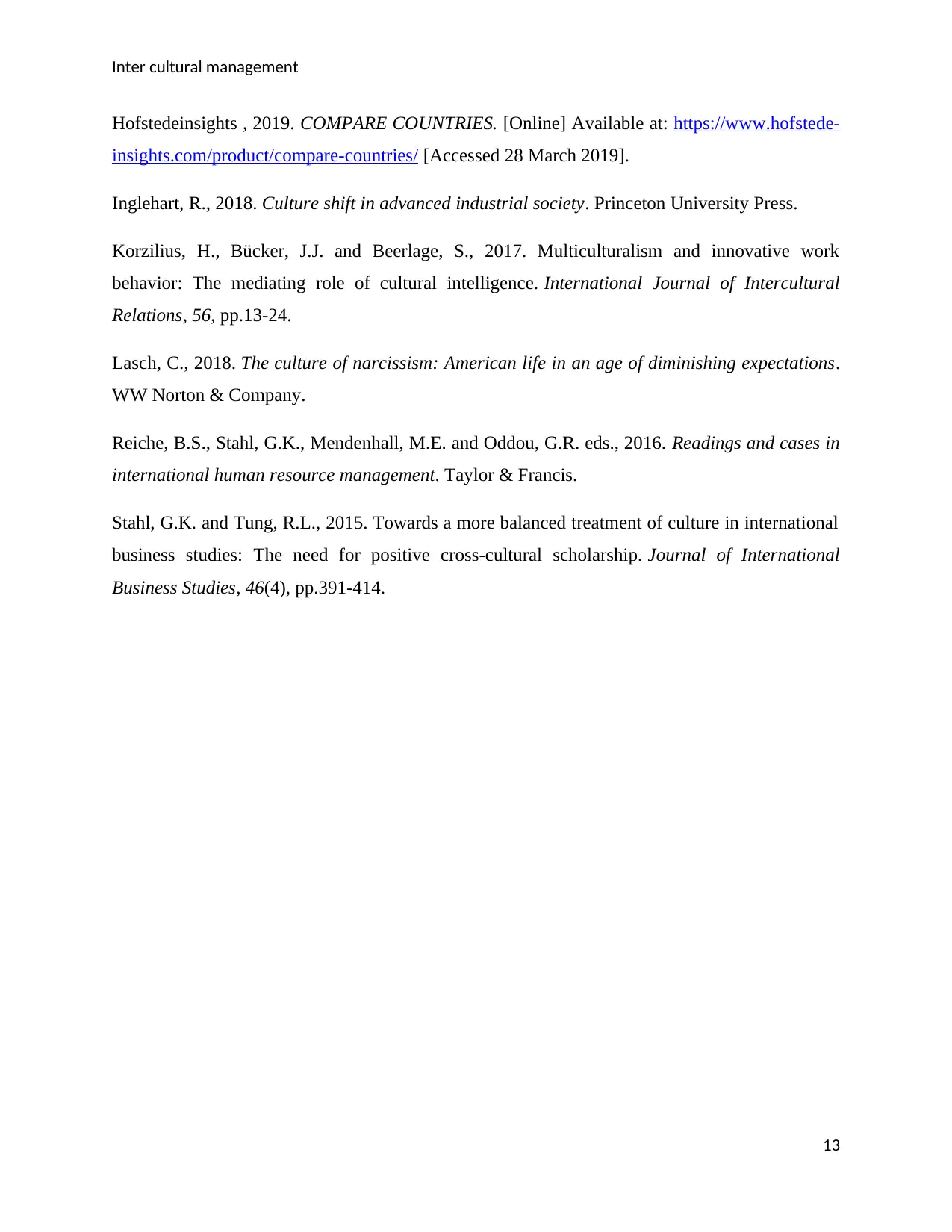
Inter cultural management
Hofstedeinsights , 2019. COMPARE COUNTRIES. [Online] Available at: https://www.hofstede-
insights.com/product/compare-countries/ [Accessed 28 March 2019].
Inglehart, R., 2018. Culture shift in advanced industrial society. Princeton University Press.
Korzilius, H., Bücker, J.J. and Beerlage, S., 2017. Multiculturalism and innovative work
behavior: The mediating role of cultural intelligence. International Journal of Intercultural
Relations, 56, pp.13-24.
Lasch, C., 2018. The culture of narcissism: American life in an age of diminishing expectations.
WW Norton & Company.
Reiche, B.S., Stahl, G.K., Mendenhall, M.E. and Oddou, G.R. eds., 2016. Readings and cases in
international human resource management. Taylor & Francis.
Stahl, G.K. and Tung, R.L., 2015. Towards a more balanced treatment of culture in international
business studies: The need for positive cross-cultural scholarship. Journal of International
Business Studies, 46(4), pp.391-414.
13
Hofstedeinsights , 2019. COMPARE COUNTRIES. [Online] Available at: https://www.hofstede-
insights.com/product/compare-countries/ [Accessed 28 March 2019].
Inglehart, R., 2018. Culture shift in advanced industrial society. Princeton University Press.
Korzilius, H., Bücker, J.J. and Beerlage, S., 2017. Multiculturalism and innovative work
behavior: The mediating role of cultural intelligence. International Journal of Intercultural
Relations, 56, pp.13-24.
Lasch, C., 2018. The culture of narcissism: American life in an age of diminishing expectations.
WW Norton & Company.
Reiche, B.S., Stahl, G.K., Mendenhall, M.E. and Oddou, G.R. eds., 2016. Readings and cases in
international human resource management. Taylor & Francis.
Stahl, G.K. and Tung, R.L., 2015. Towards a more balanced treatment of culture in international
business studies: The need for positive cross-cultural scholarship. Journal of International
Business Studies, 46(4), pp.391-414.
13
1 out of 13
Related Documents
Your All-in-One AI-Powered Toolkit for Academic Success.
+13062052269
info@desklib.com
Available 24*7 on WhatsApp / Email
![[object Object]](/_next/static/media/star-bottom.7253800d.svg)
Unlock your academic potential
© 2024 | Zucol Services PVT LTD | All rights reserved.





